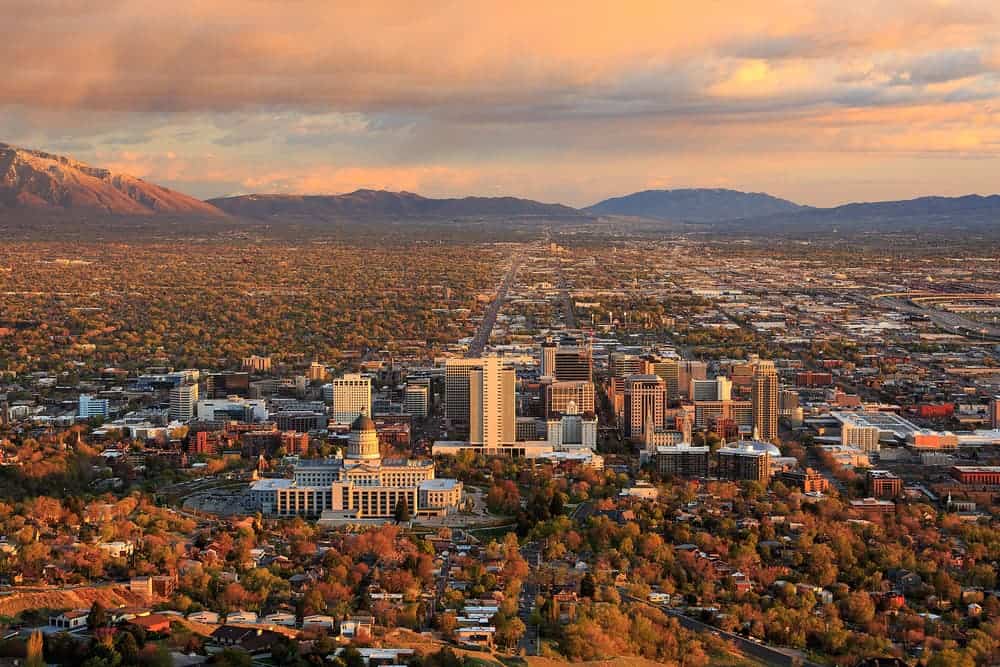Drone Laws in Utah (2024)
A list of drone regulations and links for people flying drones in Utah.
 Utah Drone Regulations
Utah Drone Regulations
Federal Drone Laws in Utah
These are drone laws that apply to every state in the U.S., including Utah, and were created by the federal government.
To fly a drone as a commercial pilot in the state of Utah (i.e. for work / business purposes) you are required to follow the requirements of the FAA’s Part 107 Small UAS Rule (Part 107), which includes passing the FAA’s Aeronautical Knowledge Test to obtain a Remote Pilot Certificate.
To fly a drone as a hobbyist in the state of Utah (i.e. for fun / pleasure) you are required by the FAA to take The Recreational UAS Safety Test (TRUST). You are also required to follow the FAA’s recreational model aircraft rules. One of those rules is that if your drone weighs more than 0.55 lbs (250g), you’ll need to pay $5 to get it registered. There are additional rules when it comes to airspace and altitude, keeping your drone within line-of-sight while you’re flying, and more.
To fly a drone as a government employee in the state of Utah (i.e., for a police or fire department) you may either operate under the FAA’s Part 107 rule or obtain a federal Certificate of Authorization (COA).
Note: The content on this page is meant for informational purposes only, and is not meant to take the place of legal counsel.
State Drone Laws in Utah
These are drone laws that apply to the entire state of Utah, and were created by the Utah State Legislature.
According to the Utah Department of Transportation and the Utah State Legislature, Utah has five state-wide laws concerning the use of drones in the state.
This law prohibits a person from intentionally, knowingly, or recklessly chasing, actively disturbing, or harming livestock through the use of UAS.
This law:
- Pre-empts local regulation of UAS and exempts UAS from aircraft registration in the state.
- Addresses UAS use by law enforcement, allowing use for purposes unrelated to a criminal investigation.
- Requires law enforcement create an official record when using UAS that provides information regarding the use of the drone and any data acquired.
- Makes it a class B misdemeanor to fly a UAS that carries a weapon or has a weapon attached.
- Modifies the offense of criminal trespass to include drones entering and remaining unlawfully over property with specified intent.
- Specifies that a person is not guilty of what would otherwise be a privacy violation if the person is operating a UAS for legitimate commercial or education purposes consistent with FAA regulations. It also modifies the offense of voyeurism, a class B misdemeanor, to include the use of any type of technology, including UAS, to secretly record video of a person in certain instances.
This law allows law enforcement agencies to use an unmanned aircraft system to collect data at a testing site and to locate a lost or missing person in an area in which a person has no reasonable expectation of privacy.
This law regulates the use of UAS by state government entities, establishing that a warrant is required for a law enforcement agency to “obtain, receive or use data” derived from the use of UAS.
This law requires law enforcement to obtain a warrant before using drones in a place where an individual has a reasonable expectation of privacy.
This law prohibits a person from operating an unmanned aircraft system in a manner that causes an unmanned aircraft to fly within an area that is under a temporary flight restriction that is issued by the Federal Aviation Administration as a result of the wildland fire, or an area designated as a wildland fire scene on a system managed by a federal, state, or local government entity that disseminates emergency information to the public, unless the person operates the unmanned aircraft system with the permission of, and in accordance with the restrictions established by, the incident commander.
This law prohibits a person from operating a drone over private property when the private property or any portion of the property is not open to the public and the person operating the unmanned aircraft is not otherwise authorized to fly the unmanned aircraft over the private property or any portion of the property.
All drone pilots operating commercially in the state of Utah are subject to the FAA’s Part 107 rules. Learn more about the FAA’s certification process to obtain a commercial drone license in this free guide.
Know something we don’t about drone laws in Utah? Send us an email at support[at]horizonap[dot]com. We do our best to keep this list up-to-date, but the reality is that given the pace of the small unmanned aerial system (sUAS) industry and how municipal governments are responding, drone regulations in Utah can change throughout the year, and changes can be hard to track. If we missed something, please reach out to let us know.

Why fly a drone in Utah? To get great shots like these!
Local Drone Laws in Utah
These are drone laws that apply only to certain regions, cities, or counties within the state of Utah, and were created by various authorities within the state.
Our team wasn’t able to pin down any local drone laws in the state of Utah. If you know of one that should be listed here, please shoot us an email at support[at]horizonap[dot]com.
Looking to get in more practice flying your drone? You can scout out safe and legal places to fly on using our guide to the Best Places to Fly a Drone in Salt Lake City.
Want to get a feel for the kind of footage you could get flying a drone in Utah? Here you go:
 Utah Drone Regulations
Utah Drone Regulations